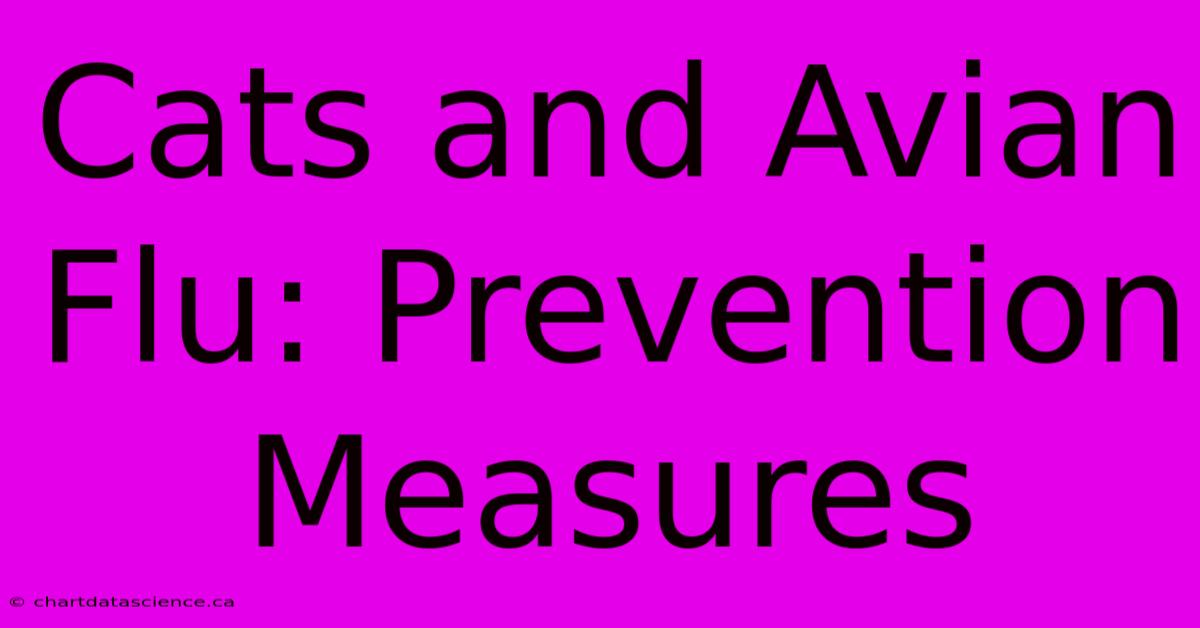Cats And Avian Flu: Prevention Measures

Discover more detailed and exciting information on our website. Click the link below to start your adventure: Visit My Website. Don't miss out!
Table of Contents
Cats and Avian Flu: Prevention Measures
Avian influenza, or bird flu, is a significant concern for poultry farmers and bird enthusiasts alike. While cats are not considered a primary host for avian flu viruses, they can still contract the disease, often through contact with infected birds or contaminated environments. Understanding the risks and implementing preventative measures is crucial to protect your feline companion.
Understanding the Risks of Avian Flu for Cats
Although rare, cats can contract avian influenza, primarily through direct contact with infected birds or their droppings. The virus can spread through:
- Direct contact: Touching or grooming an infected bird.
- Indirect contact: Contacting contaminated surfaces, such as water sources, or feed troughs.
- Ingestion: Consuming infected birds or contaminated materials.
Symptoms of Avian Influenza in Cats can vary, but often include:
- Respiratory symptoms: Coughing, sneezing, difficulty breathing.
- Gastrointestinal symptoms: Vomiting, diarrhea, loss of appetite.
- General weakness: Lethargy, decreased activity.
- Neurological signs: In severe cases, tremors, seizures.
It's crucial to remember that not all cats exhibiting these symptoms have avian influenza. Many other illnesses can cause similar signs. If your cat shows any of these symptoms, immediate veterinary attention is necessary. A veterinarian can perform diagnostic tests to determine the cause of illness and provide appropriate treatment.
Prevention is Key: Protecting Your Cat from Avian Flu
While the risk is relatively low, proactive measures can significantly reduce the chances of your cat contracting avian influenza. These preventative steps include:
Minimizing Contact with Birds
- Keep cats indoors: This is the most effective way to prevent contact with infected birds. Supervised outdoor time in enclosed areas is preferable to unrestricted roaming.
- Avoid contact with wild birds: Do not allow your cat to hunt or interact with wild birds.
- Supervise interactions with domestic birds: If you keep poultry or other birds, maintain strict separation between them and your cat.
Maintaining a Clean Environment
- Regular cleaning: Thoroughly clean and disinfect your cat's food and water bowls, litter box, and any areas where your cat spends time.
- Proper waste disposal: Dispose of bird droppings and other potentially contaminated materials properly.
- Hand hygiene: Wash your hands thoroughly after handling birds or anything that may have come into contact with birds.
Monitoring Your Cat's Health
- Regular veterinary check-ups: Schedule routine check-ups with your veterinarian to monitor your cat's overall health.
- Observe your cat's behavior: Pay close attention to any changes in your cat's behavior or appetite, and contact your veterinarian immediately if you notice anything unusual.
Responding to Potential Exposure
If you suspect your cat has been exposed to avian influenza, contact your veterinarian immediately. Early diagnosis and treatment can significantly improve the chances of a positive outcome. Do not attempt to treat your cat yourself. Your veterinarian can provide appropriate care and guidance.
Remember: Avian influenza is a serious disease, but by taking proactive measures, you can significantly reduce the risk to your feline companion. A healthy and happy cat is a priority, and prevention is the best medicine.

Thank you for visiting our website wich cover about Cats And Avian Flu: Prevention Measures. We hope the information provided has been useful to you. Feel free to contact us if you have any questions or need further assistance. See you next time and dont miss to bookmark.
Also read the following articles
| Article Title | Date |
|---|---|
| Rohit Sharmas Poor Form 2024 Cricket Update | Dec 27, 2024 |
| Pollard Smith To Meet In Premiership | Dec 27, 2024 |
| Negara Berduka Kematian Manmohan Singh | Dec 27, 2024 |
| Nosferatus Cinematography Opening Scene | Dec 27, 2024 |
| Everything We Know About Squid Game 3 | Dec 27, 2024 |
